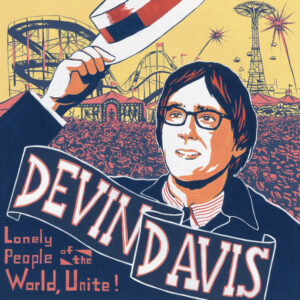This article by Robert Loerzel originally appeared in Skyline, Booster, and other Pioneer Press editions on November 23-24, 2005.
Devin Davis fans of the world, unite!

Virtually no one in the music world had heard of Wicker Park resident Devin Davis. He didn’t have a record deal. He had never played a concert tour.
And yet, Davis made one of 2005’s best albums — “Lonely People of the World, Unite!” — playing almost all of the instruments, producing the recording himself and releasing it in March on his own label, Mousse.
Like the thousands of other self-released records that come out each year, Davis’ debut was ignored by the critics at Rolling Stone, Spin and Mojo.
But Davis sent his CD to writers who run music blogs on the Internet. Many of them loved the album: a smart, funny, passionate and lively throwback to the late ’60s and early ’70s music of the Kinks and the Who.
The blog Music for Robots was where Ben Gibbard, the singer for the popular band Death Cab For Cutie, heard about “Lonely People of the World, Unite!” Gibbard went to Davis’ Web site and ordered a copy.
“I saw his name,” Davis recalls. “I do all of the orders. I put the label on the envelope. I wondered, ‘Wow? Is that Ben Gibbard of Death Cab For Cutie?'”
Gibbard liked the CD so much that he asked Davis to open a Death Cab concert. And then he raved about Davis in the November issue of Harp magazine.
“I really want everybody to hear this record,” Gibbard told Harp. “This record is just huge sounding. There is such an intensity and desperation to the performance of his songs. When we played with him recently his face was just beet red from singing these songs. It was exciting to be around someone who is just about to start this journey.”
Davis, 30, lived in Iowa for the first dozen years of his life, then moved to Jacksonville, Fla. He played there in a band called Irving, but eventually decided he needed to move to a place with more musicians — settling on Chicago as his destination. With memories of childhood field trips to the city, “I felt like I had a connection,” he says.
After moving to Chicago in 1999, Davis spent the next year and a half working temp jobs, including delivering sandwiches by bicycle. Then he landed a job at the Acme Recording Studio. He began recording his own music whenever the studio wasn’t being used by the paying clients.
“They had a beautiful room and two grand pianos and equipment I would never have had access to at home,” Davis says.
The theme of loneliness emerged out of Davis’ early experiences in Chicago.
“I didn’t know anybody when I first moved here, and it’s definitely hard to meet people,” Davis says.
But that potentially depressing theme is balanced by Davis’ comic wit — as evidenced by the exclamation point in the irreverent album title.
“I wanted it to be a little bit silly, too,” Davis says. “It’s a reaction against very serious lyrics. Everything is so dark.”
As Davis wrote and recorded his songs, he was already thinking about the sequence of tracks on the album, mentally dividing it into two sides like an old-fashioned record. At times, he left a gap between two songs, knowing that he needed to write another tune to act as a bridge between them.
To avoid the insular feeling of many one-person recording projects, “I just tried to imagine it was a band,” Davis says.
That’s not always so easy, though. “You can’t all look at each other and raise your guitars,” he says.
But if he was adding a bass part to a song that already had guitar and drums, he would “approach it as a different person,” he says.
After trying to hide his musical influences during earlier recordings with Irving, Davis let them out this time.
“‘Giant Spiders’ has a very ‘Baba O’Riley’-ish outro part,” Davis says. “I used to try hard to make something that had never ever been heard by human beings. By this point, I was like, ‘I know this sounds like “Baba O’Riley,” but who cares?'”
Davis wrapped up the recording of the album by spending almost an entire week in the studio, mixing around the clock and pausing only long enough to sleep on the studio couch.
Then, as Davis assembled a band to play the music live, he tried — without luck — to find a record label to release “Lonely People.”
“It’s too commercial for the indie labels and not commercial enough for the major labels,” he says.
But with all the attention he’s receiving, Davis hopes labels will be more interested in signing him to release his next album, which he’s writing songs for now.